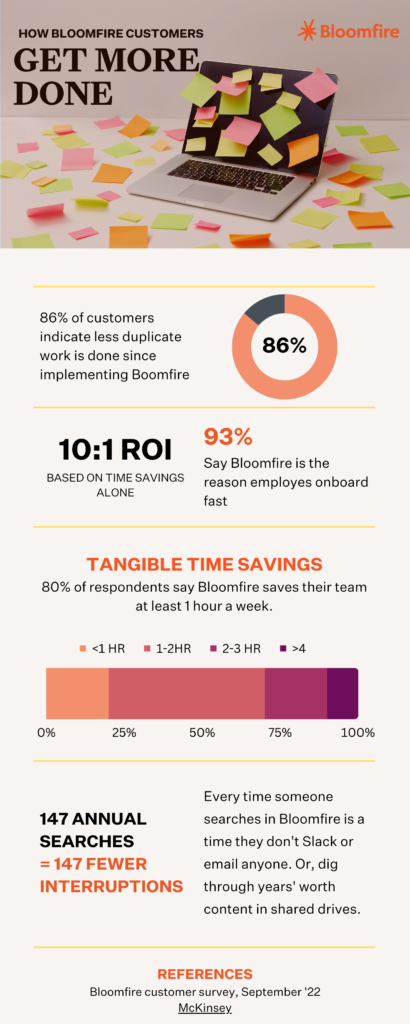How Knowledge Management Improves Efficiency

You would be hard-pressed to find a business that doesn’t have goals around improving efficiency, whether it’s a lean start-up or a well-established enterprise. And efficiency becomes especially important during periods of economic uncertainty, when business leaders are looking for ways to increase productivity while reducing costs–all while avoiding employee burnout.
There’s no shortage of advice on ways to improve business efficiency, but knowledge management is one powerful lever that often gets overlooked. A searchable knowledge management platform gives employees one place to quickly find the information they need to do their jobs, and businesses that have a knowledge management platform along with a culture of knowledge sharing save their employees’ time, decrease disruptions, and eliminate duplicate work.
4 Ways Knowledge Management Improves Efficiency
It’s one thing to say that knowledge management improves efficiency, and it’s another thing to prove it. Below, we’ll take a look at some of the specific ways knowledge management improves efficiency based on data from Bloomfire platform users.
Reduces Time Spent Searching
According to research from McKinsey, the average knowledge worker spends about 19% of their workweek (or almost one full workday) searching for the information they need to do their jobs. And the more time employees spend searching, the less time they have to make progress on impactful work. Wasting time searching for information can also be (understandably) frustrating for employees, which leads to higher levels of disengagement and lost productivity.
A good knowledge management platform reduces the time employees spend looking for information by centralizing company knowledge and making all content searchable (regardless of format). Employees know there’s one place to go for company knowledge, saving them from hunting through multiple content repositories, emails, or chat threads. They can find relevant information through a keyword search and search filters, even if they don’t know the exact piece of content they’re looking for.
In a 2022 customer data study, we found that 80% of Bloomfire users save at least one hour per week–with 30% saving three hours–by reducing the time they spend looking for information. When you multiply those average time savings by the number of employees in an organization, the efficiency gains quickly add up.
Decreases Disruptions
Think about the last time you were doing focused work and then got derailed by a coworker tapping you on the shoulder or making a request over Slack. How long did it take you to get back to what you were originally working on?
For the typical knowledge worker, the answer is pretty grim: a study from UC Irvine found that it takes employees 23 minutes on average to refocus after a disruption.
All those individual disruptions add up and have a significant impact on overall efficiency. According to workflow and efficiency expert Edward G. Brown, unnecessary disruptions cost companies an average of 6.2 hours in lost productivity every day.
Fortunately, a knowledge management platform reduces disruptions in a couple of ways. First, employees know exactly where to go to find information, which allows them to find what they’re looking for in the flow of work rather than getting derailed by a search through their email inbox, shared drive, or chat app–or by a search for the right subject matter expert. Second, those subject matter experts experience fewer disruptions because employees are finding the information they need on their own. It’s a win-win.
We’ve found that the average Bloomfire user performs 147 keyword searches in the platform per year. That’s 147 fewer disruptions, shoulder taps, and wild goose chases to hunt down information.
Eliminates Bottlenecks with Knowledge Gatekeepers
Those 147 searches per employee per year also represent 147 times an employee doesn’t have to wait on a response from a specific subject matter expert (who may or may not be working the same hours as them). When business leaders encourage their subject matter experts to document what they know in a knowledge management platform, that knowledge becomes searchable and easily accessible 24/7. This is especially valuable when employees are working remotely across different time zones and may not be online at the same time as their peers, or when an SME with specialized knowledge goes on vacation, takes leave, or even leaves the company.
Decreases Duplicate Work
Employees may duplicate work for a number of reasons–for example, they may be trying to eliminate a bottleneck created by a peer taking too long to share a resource with them, or they may just not know what already exists in another part of the organization. Whatever the reason, duplicate work can cause efficiency to take a major hit. One study found that employees spend about 6 hours a week “reinventing the wheel” or duplicating work that already exists in some format.
A knowledge management platform helps reduce duplicate work by eliminating the “we don’t know what we don’t know” problem. Employees can search their company’s comprehensive knowledge database to see what resources are already available to them, allowing them to reuse–or build on–information and documentation rather than completely reinventing it.
While reducing time spent searching for information is often the first priority for businesses implementing a knowledge management platform, reducing duplicate work is another significant efficiency benefit. 86% of Bloomfire customers report that they have reduced duplicate work since rolling out the platform.
You can dig deeper into the tangible ways knowledge management improves efficiency by viewing our ROI of Bloomfire Lookbook and by checking out the infographic below.

A SharePoint Alternative That Unlocks Enterprise Intelligence

What Is Enterprise AI Search? (And Why Your Business Needs It)

The Value in Knowledge Sharing Sessions

Start working smarter with Bloomfire
See how Bloomfire helps companies find information, create insights, and maximize value of their most important knowledge.

Take a self guided Tour
See Bloomfire in action across several potential configurations. Imagine the potential of your team when they stop searching and start finding critical knowledge.
